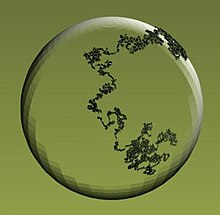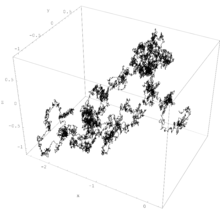
A | B | C | D | E | F | G | H | CH | I | J | K | L | M | N | O | P | Q | R | S | T | U | V | W | X | Y | Z | 0 | 1 | 2 | 3 | 4 | 5 | 6 | 7 | 8 | 9
| Part of a series on statistics |
| Probability theory |
|---|
 |

In probability theory and related fields, a stochastic (/stəˈkæstɪk/) or random process is a mathematical object usually defined as a sequence of random variables in a probability space, where the index of the sequence often has the interpretation of time. Stochastic processes are widely used as mathematical models of systems and phenomena that appear to vary in a random manner. Examples include the growth of a bacterial population, an electrical current fluctuating due to thermal noise, or the movement of a gas molecule.[1][4][5] Stochastic processes have applications in many disciplines such as biology,[6] chemistry,[7] ecology,[8] neuroscience,[9] physics,[10] image processing, signal processing,[11] control theory,[12] information theory,[13] computer science,[14] and telecommunications.[15] Furthermore, seemingly random changes in financial markets have motivated the extensive use of stochastic processes in finance.[16][17][18]
Applications and the study of phenomena have in turn inspired the proposal of new stochastic processes. Examples of such stochastic processes include the Wiener process or Brownian motion process,[a] used by Louis Bachelier to study price changes on the Paris Bourse,[21] and the Poisson process, used by A. K. Erlang to study the number of phone calls occurring in a certain period of time.[22] These two stochastic processes are considered the most important and central in the theory of stochastic processes,[1][4][23] and were invented repeatedly and independently, both before and after Bachelier and Erlang, in different settings and countries.[21][24]
The term random function is also used to refer to a stochastic or random process,[25][26] because a stochastic process can also be interpreted as a random element in a function space.[27][28] The terms stochastic process and random process are used interchangeably, often with no specific mathematical space for the set that indexes the random variables.[27][29] But often these two terms are used when the random variables are indexed by the integers or an interval of the real line.[5][29] If the random variables are indexed by the Cartesian plane or some higher-dimensional Euclidean space, then the collection of random variables is usually called a random field instead.[5][30] The values of a stochastic process are not always numbers and can be vectors or other mathematical objects.[5][28]
Based on their mathematical properties, stochastic processes can be grouped into various categories, which include random walks,[31] martingales,[32] Markov processes,[33] Lévy processes,[34] Gaussian processes,[35] random fields,[36] renewal processes, and branching processes.[37] The study of stochastic processes uses mathematical knowledge and techniques from probability, calculus, linear algebra, set theory, and topology[38][39][40] as well as branches of mathematical analysis such as real analysis, measure theory, Fourier analysis, and functional analysis.[41][42][43] The theory of stochastic processes is considered to be an important contribution to mathematics[44] and it continues to be an active topic of research for both theoretical reasons and applications.[45][46][47]
Introduction
A stochastic or random process can be defined as a collection of random variables that is indexed by some mathematical set, meaning that each random variable of the stochastic process is uniquely associated with an element in the set.[4][5] The set used to index the random variables is called the index set. Historically, the index set was some subset of the real line, such as the natural numbers, giving the index set the interpretation of time.[1] Each random variable in the collection takes values from the same mathematical space known as the state space. This state space can be, for example, the integers, the real line or -dimensional Euclidean space.[1][5] An increment is the amount that a stochastic process changes between two index values, often interpreted as two points in time.[48][49] A stochastic process can have many outcomes, due to its randomness, and a single outcome of a stochastic process is called, among other names, a sample function or realization.[28][50]

Classifications
A stochastic process can be classified in different ways, for example, by its state space, its index set, or the dependence among the random variables. One common way of classification is by the cardinality of the index set and the state space.[51][52][53]
When interpreted as time, if the index set of a stochastic process has a finite or countable number of elements, such as a finite set of numbers, the set of integers, or the natural numbers, then the stochastic process is said to be in discrete time.[54][55] If the index set is some interval of the real line, then time is said to be continuous. The two types of stochastic processes are respectively referred to as discrete-time and continuous-time stochastic processes.[48][56][57] Discrete-time stochastic processes are considered easier to study because continuous-time processes require more advanced mathematical techniques and knowledge, particularly due to the index set being uncountable.[58][59] If the index set is the integers, or some subset of them, then the stochastic process can also be called a random sequence.[55]
If the state space is the integers or natural numbers, then the stochastic process is called a discrete or integer-valued stochastic process. If the state space is the real line, then the stochastic process is referred to as a real-valued stochastic process or a process with continuous state space. If the state space is -dimensional Euclidean space, then the stochastic process is called a -dimensional vector process or -vector process.[51][52]
Etymology
The word stochastic in English was originally used as an adjective with the definition "pertaining to conjecturing", and stemming from a Greek word meaning "to aim at a mark, guess", and the Oxford English Dictionary gives the year 1662 as its earliest occurrence.[60] In his work on probability Ars Conjectandi, originally published in Latin in 1713, Jakob Bernoulli used the phrase "Ars Conjectandi sive Stochastice", which has been translated to "the art of conjecturing or stochastics".[61] This phrase was used, with reference to Bernoulli, by Ladislaus Bortkiewicz[62] who in 1917 wrote in German the word stochastik with a sense meaning random. The term stochastic process first appeared in English in a 1934 paper by Joseph Doob.[60] For the term and a specific mathematical definition, Doob cited another 1934 paper, where the term stochastischer Prozeß was used in German by Aleksandr Khinchin,[63][64] though the German term had been used earlier, for example, by Andrei Kolmogorov in 1931.[65]
According to the Oxford English Dictionary, early occurrences of the word random in English with its current meaning, which relates to chance or luck, date back to the 16th century, while earlier recorded usages started in the 14th century as a noun meaning "impetuosity, great speed, force, or violence (in riding, running, striking, etc.)". The word itself comes from a Middle French word meaning "speed, haste", and it is probably derived from a French verb meaning "to run" or "to gallop". The first written appearance of the term random process pre-dates stochastic process, which the Oxford English Dictionary also gives as a synonym, and was used in an article by Francis Edgeworth published in 1888.[66]
Terminology
The definition of a stochastic process varies,[67] but a stochastic process is traditionally defined as a collection of random variables indexed by some set.[68][69] The terms random process and stochastic process are considered synonyms and are used interchangeably, without the index set being precisely specified.[27][29][30][70][71][72] Both "collection",[28][70] or "family" are used[4][73] while instead of "index set", sometimes the terms "parameter set"[28] or "parameter space"[30] are used.
The term random function is also used to refer to a stochastic or random process,[5][74][75] though sometimes it is only used when the stochastic process takes real values.[28][73] This term is also used when the index sets are mathematical spaces other than the real line,[5][76] while the terms stochastic process and random process are usually used when the index set is interpreted as time,[5][76][77] and other terms are used such as random field when the index set is -dimensional Euclidean space or a manifold.[5][28][30]
Notation
A stochastic process can be denoted, among other ways, by ,[56] ,[69] [78] or simply as . Some authors mistakenly write even though it is an abuse of function notation.[79] For example, or are used to refer to the random variable with the index
Antropológia
Aplikované vedy
Bibliometria
Dejiny vedy
Encyklopédie
Filozofia vedy
Forenzné vedy
Humanitné vedy
Knižničná veda
Kryogenika
Kryptológia
Kulturológia
Literárna veda
Medzidisciplinárne oblasti
Metódy kvantitatívnej analýzy
Metavedy
Metodika
Text je dostupný za podmienok Creative
Commons Attribution/Share-Alike License 3.0 Unported; prípadne za ďalších
podmienok.
Podrobnejšie informácie nájdete na stránke Podmienky
použitia.
www.astronomia.sk | www.biologia.sk | www.botanika.sk | www.dejiny.sk | www.economy.sk | www.elektrotechnika.sk | www.estetika.sk | www.farmakologia.sk | www.filozofia.sk | Fyzika | www.futurologia.sk | www.genetika.sk | www.chemia.sk | www.lingvistika.sk | www.politologia.sk | www.psychologia.sk | www.sexuologia.sk | www.sociologia.sk | www.veda.sk I www.zoologia.sk









